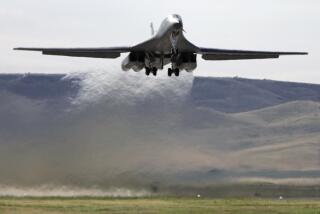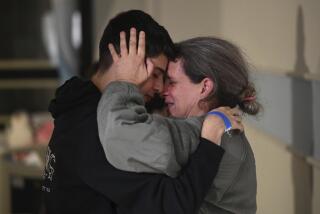Downed Pilots Endured ‘Severe’ Treatment, but GIs Fared Better : Prisoners: American fliers apparently got the worst of ordeal in Iraqi captivity.
- Share via
WASHINGTON — The eight U.S. Air Force pilots released last week by the Iraqis were forced to live on a daily diet of a few slices of pita bread and a cup of broth, and several were physically injured by their captors, a ranking Air Force doctor reported Monday.
Brig. Gen. Robert Poel told a press conference that initial examinations of the airmen at Andrews Air Force Base in Maryland showed that some had lost as much as 30 pounds during their confinement and several had contracted intestinal parasites.
Separately, a senior Army physician said examinations of five Army personnel who had been prisoners of war showed that they had not been physically injured and had been given “acceptable” medical treatment by their captors.
The Iraqis treated the Air Force pilots “in a very severe fashion,” said Poel, who is commander of the Malcolm Grow Medical Center at the base. “They parachuted into a very hostile environment.”
Poel said the airmen, who arrived at the base Sunday, suffered from malnutrition and many had fatigue. Some had spent as long as 40 days in captivity.
He declined to discuss which pilots had been injured by the Iraqis or detail their injuries. Pentagon officials have repeatedly refused to describe the extent of POW mistreatment, although Iraqi film of captured U.S. pilots suggested that some were coerced to make public statements criticizing the war.
Poel said the statements “indeed were given under duress, of a variety of sorts.” But he declined to elaborate.
Poel said injuries to the fliers included broken bones, hearing problems and scrapes and bruises. Some of the injuries were inflicted when the fighter pilots ejected from their aircraft, he said. Although he declined to outline which injuries were by accident and which by Iraqi design, he said none of the airman had been shot when they reached the ground.
He also contended that none of them would suffer permanent psychological damage.
“In people of this sort, we would expect their mental health to be outstanding when this is all over with,” Poel said.
The soup served to the airmen was the thinnest broth, he said. “Occasionally, by accident, there would be a little piece of potato that slipped in. . . . But usually, if there was anything of substance . . . the guards would get that.”
Army physicians are treating 157 wounded Army personnel, including 5 POWs, 24 victims of an Iraqi Scud attack and 37 others with combat-related injuries.
Officials said that while some of the Army prisoners were subjected to verbal abuse, only Sgt. Daniel J. Stamaris Jr., 31, of Boise, Ida., appeared to have suffered physically at the hands of the Iraqis. Stamaris broke his left thigh bone, pelvis and foot when his helicopter was shot down on a rescue mission over enemy territory, and his captors transported him in a truck for nearly three days with no pain-killers, said Col. Russ Zajtchuk, deputy commander of Walter Reed Army Medical Hospital.
“The pain would have been very severe,” Zajtchuk said.
Both physicians said the former POWs had been offered psychiatric counseling. None of the Army personnel had accepted the offer, Zajtchuk said, and doctors “had not detected any psychological stress-related problems so far.”
Poel said the pilots had a chance to spend up to seven hours with their families Sunday evening after arriving at Andrews Air Force Base. One pilot used the time to get acquainted with a baby, now two weeks old.
Monday morning, the pilots began examinations that included X-rays, blood tests and EKGs. They will be debriefed over the next five days about “the minutest details of their activity” by Air Force intelligence officers, Poel said.
Zajtchuk said the five Army POWs suffered mainly light flesh wounds and broken bones sustained before their capture.
Also injured with Stamaris were Maj. Rhonda L. Cornum, 36, of Freeville, N.Y., and Specialist Troy A. Dunlap, 20, of Massac, Ill. Although Stamaris was the most seriously injured, Cornum broke both upper arms and fractured the bones in her hands. Dunlap received minor injuries and was listed in good condition.
The other two former prisoners--Specialists Melissa Rathbun-Nealy, 21, of Newaygo, Mich., and David Lockett, 23, of Bessemer, Ala.--were wounded slightly by shrapnel from artillery explosions before their capture.
More to Read
Sign up for Essential California
The most important California stories and recommendations in your inbox every morning.
You may occasionally receive promotional content from the Los Angeles Times.














